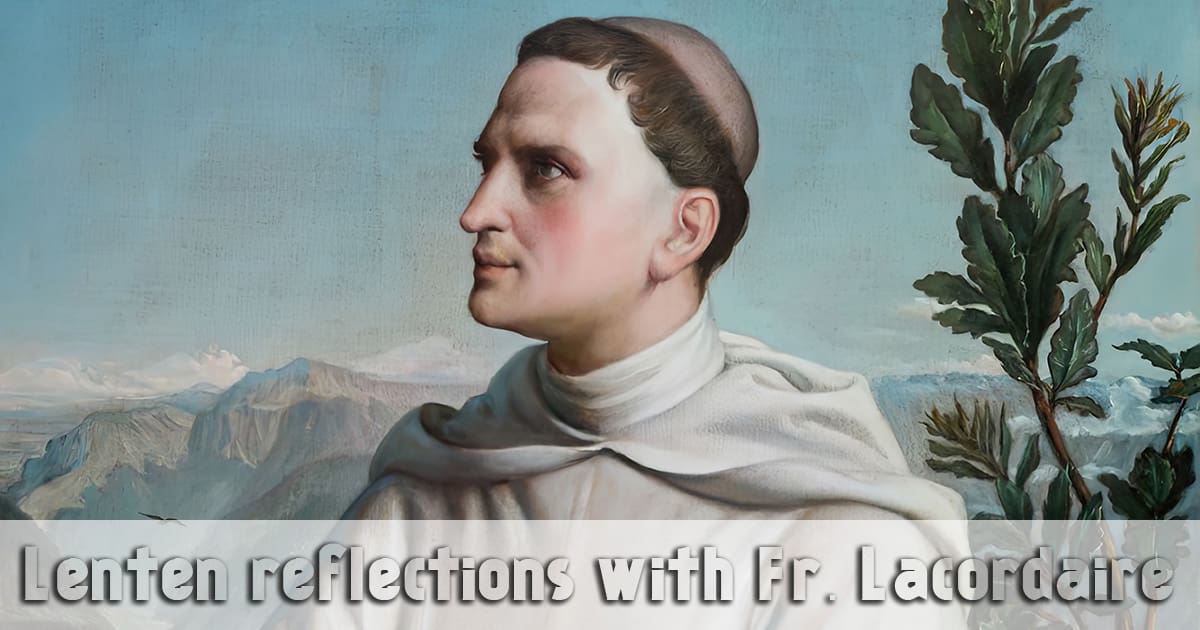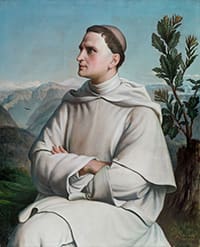Lenten Conferences of Fr. Lacordaire No. 24

The hand which shares with others
Conferences of the Rev. Père Lacordaire, p. 574-576
I maintain two things in regard to voluntary community of possessions and living; namely, that it is the most exalted economical idea, and the most exalted philanthropical idea which the world has known. In the first place, it is the most exalted economical idea; for, … economically speaking, what do we seek? We have limited possessions, and desires which are but little limited; it was needful to find the secret of diminishing desires by multiplying possessions, and by sharing them. Now, the voluntary community of possessions and of living produces this threefold effect; it divides possessions, increases their measure, and diminishes the need which we have of them. Under this rule, he who has most, brings voluntarily to him who has little, or who has nothing; he who has nothing, or but little with regard to the body, but who is rich in mind, brings his part in intelligence; he who is poor at the same time in regard to the body and the mind, can give something still better to the community, in bringing to it a solid virtue. So that there is communion of patrimony with deprivation of possessions, great ability with little, strength with weakness, all the disadvantages compensated by all the advantages; and the result is a mutual sharing, a brotherhood, an artificial family as free as equitable, who present to our imagination and to our sentiment of justice, the ideal of perfection. There are some among you, … who have visited a community of La Trappe [monastery 84 miles from Paris], —I call them to witness. What have they not felt on beholding that assembly of men so different in origin, age, history, and recollections; one bears upon his face the scars of combats; another’s brow is lighted up by the brightness of imagination; a third bears the indelible furrow of conquered love; a fourth exhibits laborious hands accustomed to hard toil; all these existences, in fine, which were so prodigiously unequal in their birth and in their course, and have here become blended together in the divine equality of one and the same destiny until death. This spectacle has forcibly touched the hearts of all those who have beheld it; not one, however great his unbelief in God might have been, has refused to that work of His right hand a quarter of an hour’s faith and admiration. How, in fact, can it be resisted, and what more can be desired in equity? What more, for the man who is still alive to the selfishness of the world, and who, even in the bosom of family, in the midst of the most sacred interests, has found again the concentration of self, and the exclusion of others? What more than having met with men who have risen superior to personality, giving their whole being for a little bread, which is dealt out to them day by day; and, even were they princes in the region of intelligence or birth, making themselves willingly the least and the last amongst their brethren? Let those who are distant say what they may against such an institution, no one will cross the threshold, to examine it closely, without returning more discontented with himself, and without having learned something about man and about God, which will often afford him food for thought. Besides the equitable sharing of possessions, the monastic institution greatly increases their measure and their value. Strange circumstance! Trappists settle upon a soil which hardly suffices to nourish one or two families; a hundred of them live there, and live easily! That sweat of devotedness, mingled with the earth, fertilizes it, and causes it to produce fruits which it never accords to any other cultivation. It would seem that God, who labours always with man, lends his help more bountifully to the hand which shares with others; and that the earth itself, become sensible to fraternity, shows itself jealous on that occasion to unite with God and man by a greater efficacy. It is easy to prove this. Visit one of those monasteries which I named just now; study there the whole economical system; consult the nature of the soil, examine the harvests, count the number of the inhabitants, and you will be astonished that the earth, elsewhere so niggardly, should there be so prodigal, and sometimes so in spite of swamps, and sands, and rocks. You will behold, with your own eyes, the poor flocking to the house of prayer, and receiving there the daily portion which is prepared by the brotherhood from within for the brotherhood which is without: for the Cenobite [member of a religious community] does not envelope himself in his poverty as in a personal benefice; he distributes its treasure to the poverty of the stranger…
Jean-Baptiste-Henri-Dominique Lacordaire (1802-1861) was a renowned preacher and restorer of the Order of Preachers (Dominicans) in France. He was a great friend of Frederic Ozanam (in fact, he is the author of a very interesting biography on Ozanam) and very close to the Society of St. Vincent de Paul.
Image: Lacordaire, painted by Louis Janmot (1814-1892), friend of Frederic Ozanam and an early member of the Society of St. Vincent de Paul.
*Source: Conferences of the Rev. Père Lacordaire: Delivered in the Cathedral of Nôtre Dame, in Paris. Author: Jean Baptiste Henri Dominique Lacordaire. Translated from the French by Henry Langdon. Publisher: T. Richardson in 1853.








0 Comments